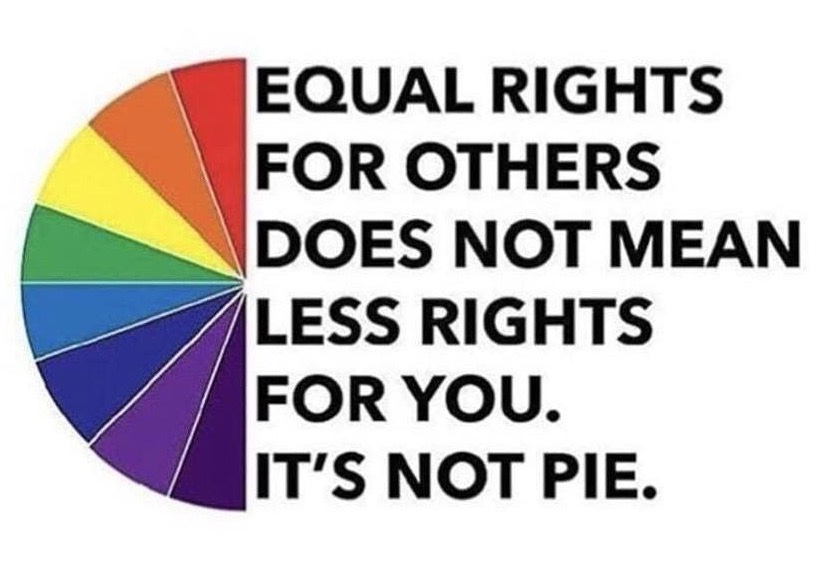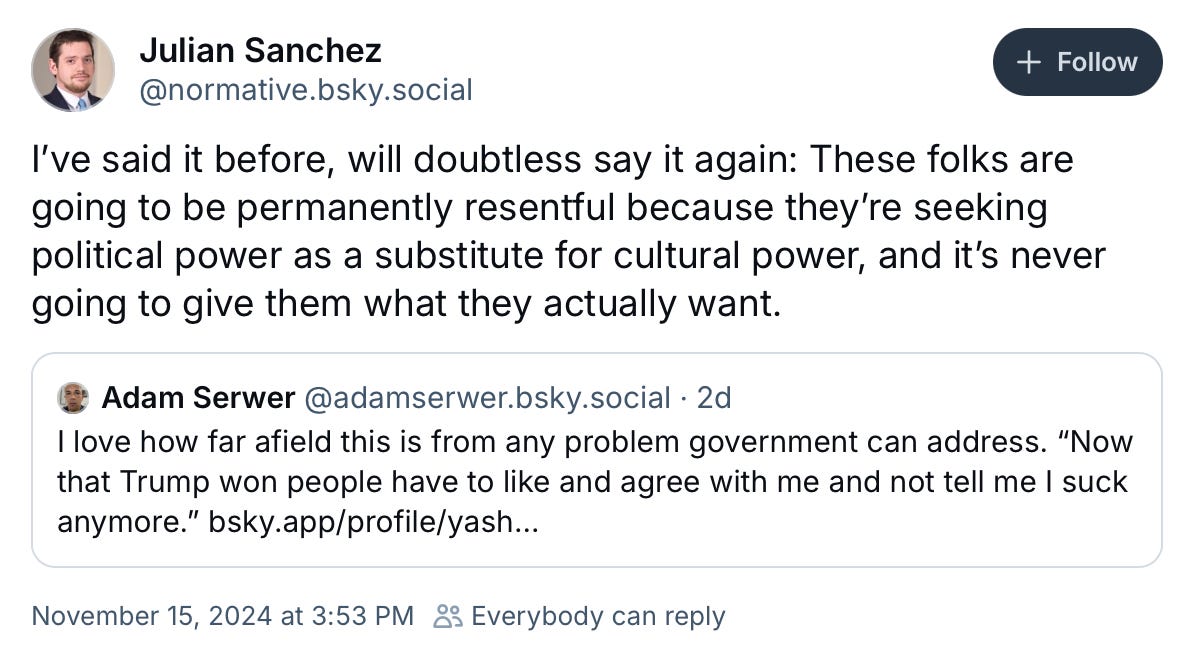It has been said that one major difference between the left and the right is each side’s view of human nature. Conservatives usually start from the assumption that human nature is fixed, in the sense that every man is subject to the same influences, desires and corruptions, no matter his station. Liberals usually start from the premise that humans are a product of their surroundings and can therefore rise or fall according to their education and opportunity. Quite different starting points with quite different implications. Here’s another way I could frame it: conservatives are pleasantly surprised at human greatness whereas liberals (and their progressive cousins) are unpleasantly surprised by human wickedness.
(Progressives are their own category with a godless morality of identity, so please supply your own “not all’s”.)
If that is roughly true, it may explain some of the rage and confusion after recent wins in the culture war fell in conservatives’ favor. I’ve read many screeds from folks who cannot accept that anyone could work so hard to remove pornographic books from school libraries and drag queens from story hours for any reason other than ignorance or malice. Nor can they understand why someone would fight against abortion, homosexual marriage or transgenderism (and the coming battle over “minor attracted persons”). This mindset even shows up in churches: those who view choice and change as unalloyed good cannot fathom why anyone would oppose the ordination of women. These things are seen as steps to equity, personal empowerment and actualization, so standing in the way is cruel.
I once puzzled over why it is so hard to convince some people that compassion and justice don’t always involve everyone getting everything they want. Although the adage about the impossibility of pleasing all the people all the time is fairly concrete and affirmed by reality, when it comes to the idea of human rights, things can turn mystical. It’s something to do with math. And pie. But, really, nothing like math or pie:
So, you see the problem? In the mind of a liberal, with their assumptions about humanity, there is no downside to making up rights and assigning them to anyone who demands them. Our capacity for accomodation must be infinite if we are to prove that we are modern and affirming1. Even if you are personally opposed to some of these things, they reason, why stand in the way of others’ ability to live how they like? If that is their choice, then who are you to say what’s good for them? It’s a free country after all. Here is one example of that sentiment:
And another, a little more blunt:
You have the choice to leave the book in the library, they have the choice to give it to their trans child. Problem solved! This ability to choose is part of the moral substrate that the liberal left will point to when asked about how a society should police human behavior. Other rules include:
as long as it’s not hurting anyone else
as long as you don’t impose your views on anyone else
as long as there is consent
However, these constraints can’t really hold any weight when it comes to supporting things that make for a flourishing society. There actually is a pie. A system based around individual autonomy, choice and consent is plainly dangerous if you consider road rules, or property rights. One driving however he likes or taking whatever he wants as his own is picking away at someone else’s slice. Those examples are easy. But that clarity seems to fade when thinking about issues of personal choice.
Immorality is a social contagion, a truth often overlooked by our left wing friends. Admittedly, it is harder to spot since the damage is usually absorbed into the cultural ether. Those mad at the overturning of Roe or at Christopher Rufo’s campaigns against woke books in libraries or Libs of TikTok’s exposure of sexual deviancy at Pride parades see these actions as heavy-handed oppression of personal choice. It is not as easy to connect identity politics with race-based violence, as it is to see theft. Or to connect Pride merch at Target with the rise in chemical castrations at children’s gender clinics as it is to spot a DUI. But we must.
A society cannot promote two contradictory things as good and continue well. Permissiveness in one part of a culture does not stay hermetically sealed off from the rest of society, because sin spreads.2 Consider the call for lax drug laws or easy access to pornography. Advocates will say these things are personal choices and none of your business. (It is understandable to want government involved in less areas of your life, rather than more – conservatives would largely agree with that instinct.) But what about the damage done when a man drives a vehicle while he’s high? What about the well-documented dysfunction that flows into a marriage after a lifetime of using porn? What about the messages sent when a society embraces the idea that ending a life is better than suffering on? How is it not society’s business when a governor puts tampon dispensers in boys’ bathrooms? The incongruence will set you against each other or drive you to madness.
Facing up to the totality of Adam’s fall is the only honest place to start when it comes to thinking about life together. In reality, there is no such thing as personal morality, no such thing as private sin. Promotion of sin and immorality goes to work on the concupiscent hearts of men, enticing them to participate. Miriam Cates, who is a TV presenter in the United Kingdom made such a case, even as her homeland is facing the prospect of a devastating foray into “assisted dying”:
“Whenever an important moral or cultural boundary is deliberately weakened, it will always, eventually, burst wide open…Firm moral boundaries are there to protect the weak and vulnerable. There are always individual cases where those boundaries seem harsh. But the alternative—to reject the boundaries altogether—always leads to far worse damage. We know this from our own personal human nature.”
Finally, for all the bewildering potential that the political change in the USA has promised, Christians cannot be complacent about the direction of our culture. If we wish to preserve and protect the best of our Christian heritage, here is an observation from a liberal who points to something we will need to consider:
Although bad law does enable the proliferation of sin – and conversely, good law puts a hedge around righteousness – in many ways this guy is right. If you cannot change the minds and hearts of people, the nation will rise and fall with its political will. The end of Roe’s abortion regime is a salient example for conservatives. Rather than the desire to protect babies breaking out all over the country once the law was lifted, some were dismayed to discover that many pro-life commitments were just bluster – many who were running their mouths about protecting unborn life costs would also claim their hands were tied. On the other side of the political aisle, the left may be sorely disappointed to find that their efforts to increase tolerance and understanding through workplace pressure and Hollywood saturation have also failed to really change anyone’s heart.
So, laws can be a help to promoting godliness, but they cannot change hearts. We don’t need better government – though that is desirable – we need better men. It’s exciting to contemplate the prospect of an administration that will bring the weight of the state to help guard things we hold dear. But be clear minded about the limits of what education and law and opportunity can achieve. Don’t put your hope in princes – boldly live for Jesus Christ, the one who changes mens’ hearts and makes them new creations.
You must disagree before you can be tolerant of another, but that word has been manipulated.
Of course, I am not suggesting that staying locked in a box would be a tilt at righteous perfection, only that being around people presents fresh sinful opportunities and influences! Maybe if you are the sole occupant of a remote island, you will have no one to answer to but God. Yet it is not hard to see that when it comes to societies living together peacefully, “live and let live” is just a slogan, no matter how much some want it to be true.













This reminds me of a quote by Herman Melville: "We cannot live only for ourselves. A thousand fibers connect us with our fellow men; and along these fibers, as sympathetic threads, our actions run as causes and they come back to us as effects."